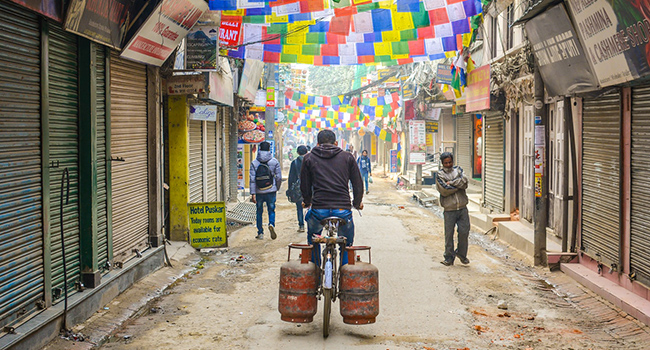By Constantine Passaris
and Murshed Chowdhury
University of New Brunswick
The COVID-19 global pandemic has widened the economic disparity between developed and developing countries. The economic consequences have been uneven.
Canadians have good reason to be concerned about their economic future and livelihoods in the post-pandemic period. However, a global comparative assessment reveals that we’re significantly better off than most of the world’s population.

Constantine Passaris
In many respects, the sentiments of developing countries when they compare themselves to the developed world is a combination of admiration and envy.
While Canadians grumble about the economic bite inflicted by the pandemic, they have a financial support system and a safety net unlike that in most countries.
Few countries can rely on the security and dependability of a well-oiled machinery of economic governance, a federal and provincial financial support system to come to their assistance during hard times, and a fairly robust universal health-care system. These are luxuries unavailable to the citizens of the developing world, who number more than 6.5 billion or 85 per cent of the world’s population.
As the world begins to wake up from this pandemic nightmare, reopening the Canadian economy and other economies around the world carries their own asymmetric challenges.
Most developed countries are implementing a gradual and cautious reopening of their economies, taking their cue from a declining trend in COVID-19 infections. That’s not an option for most developing countries.

Murshed Chowdhury
Developing economies can’t wait that long since they face a different set of realities and challenges. A prolonged lockdown for developing countries brings to the fore a choice between saving lives and protecting livelihoods.
Due to their weak social safety nets, food insecurity and inadequate institutional frameworks, developing countries fear that many more people would die from hunger than from the infectious virus. They’re prepared to gamble with a surge in infections resulting from a quick reopening and avoid the possibility of mass starvation.
Policy-makers in developing countries argue that a prolonged lockdown will cause more long-term financial harm and result in more deaths than reopening their economies immediately.
The reality is that governments in developing countries don’t have an effective outreach to a large segment of the population, especially street vendors, rickshaw pullers and the most vulnerable, who have low or no savings and live in shanty towns. This marginalized portion of the workforce can’t afford a prolonged economic lockdown.
The cruelest part of this decision is quantifying which lives matter the most and initiating public policies to save them. This rationale loses sight of the social and cultural value of human lives. It becomes an economic choice between two bad outcomes in the form of a prolonged shutdown or a quick reopening. They opt for one that incurs the lower number of economic casualties.
One of the more glaring disparities between developed and developing countries is in the delivery of education during the pandemic. Canadian school systems immediately switched to online or alternative delivery methods for their curriculum. While this process came with some challenges, students didn’t miss out on their school year and timely graduations.
The picture in developing countries wasn’t as rosy. They had no operational alternative but to shut down their schools and universities until further notice. Harnessing electronic connectivity and the Internet infrastructure for schooling wasn’t an option. So most students in developing countries have lost at least one year of schooling.
In a globalized world, no one is immune from the medical, economic and social consequences of the pandemic. Developing countries are crying out for some financial largesse from developed countries. This isn’t just a matter of a financial aid. It would be an astute global business recovery plan.
Some economists have advocated for a 21st-century Marshall Plan to cushion the disastrous economic consequences for developing countries from the pandemic and help them regain their economic development trajectories.
The sooner developing countries can get out of their economic tailspin, the sooner they can open their domestic markets for trade with developed countries.
The slogan “We are all in this together” isn’t simply an aspirational outcome – it’s an economic objective.
COVID-19 has exposed our collective weaknesses, fault lines and vulnerabilities.
If the virus is present somewhere, it’s a threat everywhere. Our effective response to COVID-19 should take to heart the message that a global village is only as strong as its weakest link.
And sometimes it takes a crisis for everyone to see the inequalities that were there all along.
Dr. Constantine Passaris is a professor of economics and Dr. Murshed Chowdhury is an associate professor of economics at the University of New Brunswick.
Constantine and Murshed are a Troy Media Thought Leaders. Why aren’t you?
The views, opinions and positions expressed by columnists and contributors are the author’s alone. They do not inherently or expressly reflect the views, opinions and/or positions of our publication.

